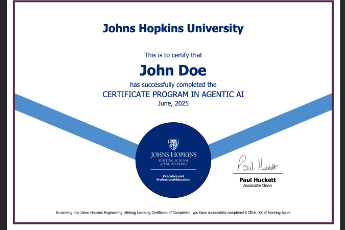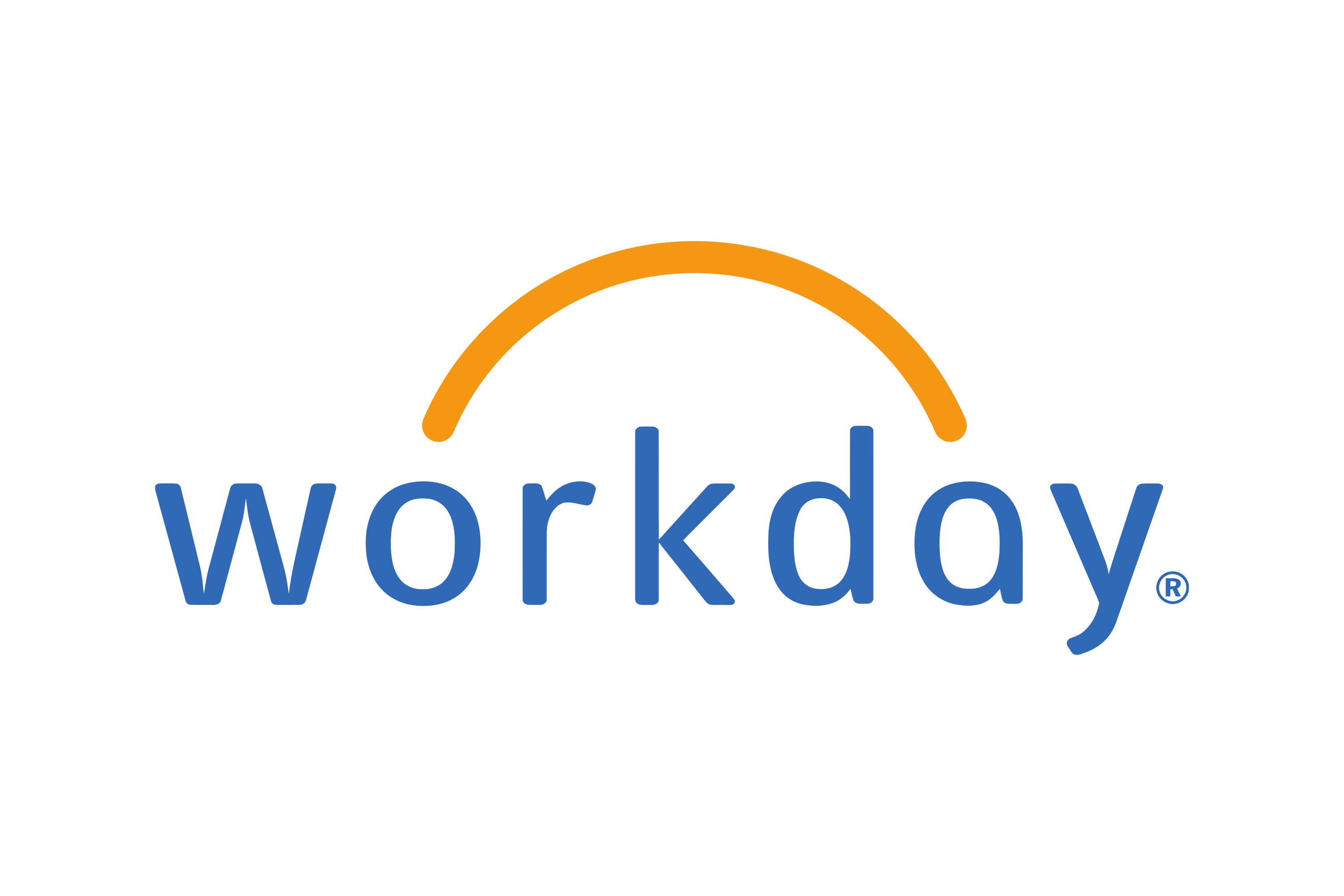Learn more about the course
Get details on syllabus, projects, tools, and more

Certificate Program in Agentic AI
Application closes 12th Feb 2026
PROGRAM OUTCOMES
Grow your career with Agentic AI skills
Build agents that perceive, reason, plan, act, and learn with Python and AI
-
Integrate skills into functional agent-based systems to solve real-world problems
-
Design agents using symbolic, BDI, and LLM architectures for specific tasks
-
Address ethical and safety challenges in AI deployment with responsible AI principles
-
Evaluate agent behavior in complex multi-agent and human-agent environments
Earn a Certificate of Completion from Johns Hopkins University
KEY PROGRAM HIGHLIGHTS
Learn from a top-ranked university
-

Learn from a top-ranked university
Learn from expert JHU faculty and industry leaders.
-

Industry-focused curriculum
Gain practical skills in agentic architectures, reasoning models, multi-agent systems, reinforcement learning, and more.
-

Flexible learning format
Learn from a blend of recorded lectures, live mentored sessions, and AI-assisted learning tools.
-

Live masterclass, hands-on projects
Work on real-world, hands-on projects to build practical skills in Agentic AI and stand out to employers.
-

Live mentorship by industry experts
Benefit from professional insights from expert industry practitioners in AI, refine your projects, and set yourself up for success in the field.
-

Dedicated support
Access a dedicated Program Manager and Academic Learning Support, which includes discussion forums and peer groups for a comprehensive learning experience.
Skills you will learn
Agent Architecture and Design
Reinforcement Learning
Human-Agent Collaboration
Python Programming for Agentic AI
LLM Integration & Prompt Engineering
Agentic AI Frameworks
Agent Architecture and Design
Reinforcement Learning
Human-Agent Collaboration
Python Programming for Agentic AI
LLM Integration & Prompt Engineering
Agentic AI Frameworks
- Overview
- Learning Journey
- Curriculum
- Tools
- Certificate
- Faculty
- Mentors
- Fees
- FAQ

This program is ideal for
Professionals looking to advance their careers with Agentic AI skills
-
STEM Professionals
For technical professionals with experience in programming, mathematics, or system design.
-
Data and AI Professionals
Data Scientists, AI Engineers, and ML practitioners looking to develop autonomous agent systems.
-
Technical Managers and Product Managers
For leaders aiming to guide intelligent automation and integrate agent-based AI into business workflows.
-
Aspiring Tech Professionals
Learners without coding backgrounds can start with Python prep modules and advance with structured support.
Experience a unique learning journey
Our pedagogy is designed to ensure a holistic learning experience
-
Learn from world-renowned faculty
Learn critical concepts through live masterclasses and recorded video lectures by JHU faculty
-
Engage with your mentors
Clarify your doubts and gain practical skills during weekly live sessions with industry experts
-
Work on hands-on projects
Work on projects to apply the concepts & tools learnt in the module
-
Get personalized assistance
Our dedicated program managers will support you through your learning journey
Comprehensive curriculum
The Agentic AI program curriculum, crafted by the expert faculty at Johns Hopkins University and leading industry practitioners, covers everything from Python foundations to advanced AI frameworks, equipping you with the skills to design and deploy autonomous systems.
PRE-WORK: PYTHON REFRESHER FOR AGENTIC AI
This module will equip you with all the tools you need for your learning journey and provide a solid foundation in Python, object-oriented programming, and key data science libraries. ; Pre-Work 1: Landscape of AI, GenAI, and Agentic AI ; Pre-Work 2: Python Basics
MODULE 1: PROMPT ENGINEERING FOUNDATIONS
In this module, you'll get a solid understanding of the fundamentals of Prompt Engineering in Generative AI. You'll learn how Large Language Models (LLMs) operate, uncover the mechanics behind their capabilities, and see how carefully crafted prompts can improve results. This module also introduces Agentic AI, where systems make decisions and take actions based on reasoning similar to humans. By the end, you’ll have practical knowledge of various prompting strategies and how to use retrieval techniques to enhance AI-generated responses.
WEEK 01: PYTHON REFRESHER FOR AGENTIC AI
WEEK 02: INTRODUCTION TO LARGE LANGUAGE MODELS
WEEK 03: PROMPT ENGINEERING TECHNIQUES AND RAG
WEEK 04: PROJECT 01
WEEK 05: LEARNING BREAK
MODULE 2: INTRODUCTION TO AGENTIC AI DESIGN
In this module, you’ll gain a comprehensive understanding of Agentic AI, focusing on its key concepts, distinct characteristics, and practical applications. You’ll learn what defines an agent, how the environment and agent properties influence behavior, and how autonomy, goal complexity, and reasoning interact within intelligent systems. This module blends theory and hands-on learning, helping you assess the differences between traditional AI models and agent-based systems, while also teaching you how to design agents for various real-world scenarios.
WEEK 06: INTRODUCTION TO AGENTIC AI
WEEK 07: CORE AGENT CONCEPTS
WEEK 08: ETHICS, SAFETY, ALIGNMENT & RESPONSIBLE AI
MODULE 3: DESIGNING AND BUILDING AGENTIC SYSTEMS
This module will teach you how to build intelligent agents that can learn from and adapt to their environments. You’ll explore reinforcement learning techniques, multi-agent systems, and embodied AI, giving you a comprehensive understanding of how agent behavior can be optimized. You’ll also learn how to integrate LLMs with agentic frameworks and implement what you've learned through guided case studies and projects, a core part of the Agentic AI program.
WEEK 09: PLANNING & REASONING MECHANISMS
WEEK 10: PROJECT 2
WEEK 11: LEARNING BREAK
WEEK 12: MULTI-AGENT SYSTEMS (MAS)
MODULE 4: ADVANCED AGENTIC AI FRAMEWORKS
This module equips you with ethical and advanced technical frameworks of Agentic AI. You'll explore key challenges around AI alignment, safety, and responsibility, while learning about leading agent development tools and frameworks. The goal is to help you evaluate agent behavior ethically and implement responsible AI principles in your projects. This module culminates in a hands-on project where you'll develop an intelligent customer support chatbot, applying the skills you’ve gained from the agentic AI program.
WEEK 13: REINFORCEMENT LEARNING IN AGENTS
WEEK 14: INTERACTION & EMBODIMENT
WEEK 15: PROJECT 3
WEEK 16: THE FUTURE OF AGENTIC AI
Learn in-demand tools and techniques
Build a solid foundation in popular/advanced tools and frameworks top employers seek
Earn a certificate of completion from Johns Hopkins University
Earn 11 Continuing Education Units (CEUs) upon program completion

* Image for illustration only. Certificate subject to change.
Meet your faculty
Learn from world-renowned faculty with domain expertise
Interact with our industry mentors
Interact with dedicated mentors who are current practitioners and experts in Agentic AI
Course Fees
The course fee is USD 3,000
Invest in your career
-

Learn Agentic AI design and deployment
-

Build job-ready skills in agent-based AI
-

Create an industry-ready portfolio of work
-

Earn a certificate of completion from Johns Hopkins University and stand out to employers
-
INSTALLMENT PLANS
Upto 12 months Installment plans
Explore our flexible payment plans
View Plans
-
discount available
USD 3,000 USD 2,850
USD 3,000 USD 2,850
Third Party Credit Facilitators
Check out different payment options with third party credit facility providers
*Subject to third party credit facility provider approval based on applicable regions & eligibility
Application process
Admissions close once the required number of participants enroll. Apply early to secure your spot
-

Fill application form
Apply by filling out a simple online application form.
-

Review process
A panel from Great Learning will review your application to determine your fit for the program.
-

Join program
Receive an offer for a seat in the upcoming cohort of the program post a final review.
Course Eligibility
- A STEM background with some prior familiarity with a programming language or technical subject matter in maths / data etc. is recommended.
Batch start date
-
Online · To be announced
Admissions Open
Delivered in Collaboration with:

Johns Hopkins University is collaborating with online education provider Great Learning to offer the Certificate Program in Agentic AI. Great Learning is a professional learning company with a global footprint in 14+ countries. Its mission is to make professionals around the globe proficient and future-ready. This program leverages JHU's leadership in innovation, science, engineering, and technical disciplines developed over years of research, teaching, and practice. Great Learning manages the enrollments and provides industry experts, student counselors, course support and guidance to ensure students get hands-on training and live personalized mentorship on the application of concepts taught by the JHU faculty.
Frequently asked questions
What is unique about Johns Hopkins University’s Certificate Program in Agentic AI?
The Certificate Program in Agentic AI is a 16-week online program offered by Johns Hopkins University (JHU). Key program highlights include:
- Hands-on projects using Python, OpenAI LLMs, and advanced AI frameworks like Reinforcement Learning and Multi-Agent Systems.
- Monthly live masterclasses by JHU faculty and 15 live sessions with industry experts for personalized mentorship.
- A flexible online format that allows working professionals to learn without disrupting their careers.
- Get personalized assistance from a dedicated Program Manager and academic support through the Great Learning community, project discussion forums, and peer groups
How will my performance be assessed in the Agentic AI program?
Your performance in this Agentic AI program will be assessed based on:
- Hands-on projects that involve building autonomous AI agents using Python and relevant AI libraries.
- Active participation in live sessions and peer discussionsto demonstrate your engagement and collaborative learning.
Is the Agentic AI program online?
Yes, the Certificate Program in Agentic AI offered by Johns Hopkins University is delivered fully online, offering flexibility for professionals to learn while balancing their work commitments. It combines recorded video lectures, live faculty-led masterclasses, live mentorship sessions by global industry experts, and hands-on projects to ensure an engaging and comprehensive learning experience.
Will I work on hands-on projects in the JHU Agentic AI program?
Yes, you will get to work on multiple hands-on projects in this Certificate Program in Agentic AI, such as:
- Smart Data Processing Agent: Automating the processing of employee-submitted expense bills.
- Automated Research Agent: Creating an agent that synthesizes information from multiple data sources.
- Customer Support Chatbot: Developing a chatbot for customer support with knowledge base integration. These projects allow you to apply your learning to real-world challenges.
Will I receive a certificate upon completing the program?
Yes, upon successful completion of the Certificate Program in Agentic AI, you will receive a Certificate of Completion from Johns Hopkins University, along with 11 Continuing Education Units (CEUs), and a shareable e-Portfolio showcasing your skills.
Who are the mentors for this program?
- Apple
- BlackRock
- Workday
- Newmark
- Capital One
These mentors bring practical insights and guidance based on their experiences in the AI field.
What are the rankings of Johns Hopkins University?
According to the U.S. News & World Report 2025 rankings, JHU is:
- #6 among National Universities
- #1 in Computer Information Technology
- #13 among Best Global Universities
What is the curriculum for JHU’s Certificate Program in Agentic AI?
The curriculum for the Certificate Program in Agentic AI is designed and taught by best-in-class faculty at Johns Hopkins University and leading industry practitioners. The objective of the program is to equip learners with the skills needed to solve problems and deploy Agentic AI solutions across various business applications through a range of topics, including:
- Pre Work 1: Landscape of AI, GenAI, and Agentic AI
- Pre Work 2: Python Basics
- Module 1: Prompt Engineering Foundations
- Module 2: Introduction to Agentic AI Design
- Module 3: Designing and Building Agentic Systems
- Module 4: Advanced Agentic AI
The curriculum focuses on both theory and practical application, providing a holistic approach to learning Agentic AI.
Who will be the faculty for this Agentic AI program?
The program is taught by distinguished faculty members from Johns Hopkins University, including
- Dr. Shelby Wilson: Senior Data Scientist - The Johns Hopkins University Applied Physics Laboratory
- Dr. William Gray-Roncal: Principal Research Scientist - Johns Hopkins University Applied Physics Laboratory
- Dr. Ian McCulloh: Faculty Member, Johns Hopkins University
- Dr. Pedro Rodriguez: Lead - Information Science Branch at Johns Hopkins Applied Physics Laboratory
- Dr. Iain Cruickshank: Faculty Member, Johns Hopkins University
These faculty members bring extensive academic and industry experience to the program.
What key tools and techniques will I learn in this program?
- Python
- Google Colab
- VS Code
- Vector Database (Chroma/Pinecone)
- LangGraph
- LangChain
- RAG (Retrieval Augmented Generation)
- DSPy
- OpenAI
- Autogen
- Smolagents
- CrewAI
How will Johns Hopkins University’s Certificate Program in Agentic AI help me progress in my career?
This Agentic AI program will help you progress in your career in the following ways:
- Develop a deep understanding of Agentic AI, enabling you to design systems that autonomously make decisions and adapt to new information.
- Gain practical experience with tools like OpenAI LLMs, Python, and reinforcement learning, making you highly competitive in AI-related roles.
What is the program fee?
The fee for the Agentic AI program is $3,000. For information on offers, payment plans, and eligibility for financial assistance, please reach out to the Program Advisor at Great Learning.
Is the fee refundable?
The program fee is generally non-refundable. Please contact the Program Advisor for specific cancellation and refund policies.
Who is this Agentic AI program for?
STEM (Science, Technology, Engineering, Mathematics) Professionals: Technical professionals with experience in programming, mathematics, or system design.
- Data and AI Professionals: Data Scientists, AI Engineers, and ML practitioners looking to develop autonomous agent systems.
- Technical Managers and Product Managers: Leaders aiming to guide intelligent automation and integrate agent-based AI into business workflows.
- New Entrants to Technology: Learners without coding backgrounds can start with Python prep modules and advance with structured support.
Do I need prior experience in AI or programming to enroll in this program?
No, while prior experience is beneficial, the program includes a Python prework module to ensure beginners can build a strong foundation in the required skills.
What are the prerequisites for this program?
- The ideal candidate should have a foundational understanding of programming languages or core technical concepts in mathematics, data science, or related disciplines.
- Beginners are encouraged to complete the Python Prework Module offered as part of the program to build essential skills and ensure a smooth learning experience.
Is there a deadline for the application?
The program follows a rolling admission process and will close once the required number of candidates have been enrolled. Apply early to secure your spot.
Is financial assistance available?
Yes, there are options for financial assistance and payment plans. Please contact the Program Advisor at Great Learning for more details.
What is Agentic AI? How does it differ from traditional AI?
Agentic AI refers to intelligent systems that can:
- Make autonomous decisions, reason, plan, and act independently, without constant human oversight.
- Adapt to new data and environments while pursuing defined goals.
- Unlike traditional AI, which follows pre-programmed instructions, Agentic AI systems can initiate actions and manage tasks autonomously.
How does the program incorporate Large Language Models (LLMs)?
The program offers hands-on experience with OpenAI LLMs. You will learn how to integrate these models into Agentic AI systems for tasks like reasoning, planning, and human-agent collaboration.
How does Agentic AI work?
Agentic AI operates by utilizing intelligent agents that can perceive their environment, reason through problems, plan actions to achieve goals, and act accordingly based on these plans. These agents are designed to function autonomously, adapting their behavior to dynamic situations using various techniques, such as Reinforcement Learning and Multi-Agent Systems.
What are the main applications of Agentic AI?
Agentic AI is applied in various industries, including:
- Finance for automated decision-making and risk management.
- Retail for personalized customer experiences and autonomous shopping assistants.
- Healthcare for autonomous diagnosis and personalized treatment plans.
- Supply Chain management to automate complex logistics and decision-making.
What are the challenges of developing Agentic AI systems?
Some challenges of Agentic AI development include:
- Ensuring ethical decision-making and avoiding biased or unsafe behavior.
- Addressing the alignment problem, where AI’s objectives might diverge from human goals.
- Managing the complexity of integrating autonomous systems with existing workflows and systems.



 Speak with our expert
Speak with our expert


















.png)


















